- Home
- Linda Byler
The Witnesses Page 5
The Witnesses Read online
Page 5
“If you would rather not be here, you can step out of the room,” the first one informed them.
Dat’s eyes questioned Mam, but she refused to budge. Sarah was “coming to,” and there was no way she was leaving this room.
The pain was a white-hot, blinding force that took her breath away before she had a chance to finish it. She let out a small puff of air, drew one back, and then another, before the hoarse screams would stop them entirely.
Slowly, the light above her head came into focus. The doorframe, the track beside her bed, the sour green of the walls, the clashing color of the beige curtain.
Then the waves of pain pounded across her, a tsunami, a devastating wall that set all her nerves shimmering with unaccustomed intensity, like a razor blade drawn horizontally across her wounds.
As the nurses allowed a minimal opening, her eyes or the small, red swollen appendages that had been her eyes, opened far enough to search, desperately, for someone to help her.
A face, hands, voices, but not someone who would help.
“Mm. Mm.” She strained to call Mam’s name.
Stepping aside, the nurses allowed Mam into Sarah’s line of vision. Mam never wavered. There were no tears. Her daughter was awake, she was calling for her, and she had a duty to perform.
Many nights Mam had nursed cranky babies. She had comforted her children after disturbing dreams. She had wiped vomit from their bedsides, gagging as she did so, bathed little ones smelling so sour she could taste it, poured baking soda on soiled mattresses, and tucked the sweet-smelling children back into beds made up with clean sheets—only to have the exact same scene repeated a few hours later. Those times, she didn’t think of herself, her weariness. She just went ahead and did her duty, the same as she would do now.
“Sarah.”
“Helf mich (Help me).”
“I will help you, Sarah. I will do everything I can.”
Dat stood, helpless, his eyes pooled with tears, but calm.
“Voss (What)?”
The croak was barely audible, but the question, the plea, was known and recognized, the way it banged on Mam’s heart.
“Sarah, the barn at the Widow Lydia’s? It burned. Can you remember anything at all?”
“An drink.”
Immediately, Mam understood. Of course, she was thirsty.
“She wants a drink,” she said to Dat.
Mam asked the nurses for a cup of water, but they provided only ice chips, which made Mam breathe hard, the way she did when she was huffy inside, though she was trained to be quiet, submissive.
So she held a plastic spoon of ice chips to Sarah’s swollen lips, lovingly, expertly. She held very still when Sarah gurgled, choked, and began a labored breathing that concerned the nurse. Mam figured that the ice was too cold and a cup of water would have been much better.
She needed comfrey tea and B and W salve and burdock leaves she had gathered from the fence rows and dried in the hot August sun. She needed the spring tonic she made with garlic and red pepper and aloe vera, but she knew all that would come later.
For now, they needed the care of professionals, the sterile environment, doctors with experience and knowledge far above their own.
“It hurts,” Sarah moaned.
“Sarah, you’ll need to be brave. You have to gather all your courage, every ounce of strength within you, to be able to heal. A beam fell on your head, and your clothes were on fire.”
The only answer was another onslaught of ragged cries, and the nurse tugged gently on Mam’s sleeve, drawing her away, then explained very gently about upping the pain medication, so Sarah would sleep for another few hours. The need to keep her quiet was explained in careful detail, and Mam folded her small form back into a vinyl chair and acknowledged their counsel, but the moment the door closed behind them, she turned to her husband and sputtered with indignation and suppressed emotion.
The morning sun made its appearance through the east windows on the third floor, as Sarah lay quietly. She was breathing in and out slowly, but then more shallowly as her breathing accelerated.
Over the course of the sun’s ascent, she lay, as her parents spoke quietly, with furtive glances in the direction of their sleeping daughter. They both knew the weeks ahead would tax their strength to the breaking point, but with God’s help, they would make it through.
When three doctors entered at once and stood gravely at Sarah’s bed, then turned and introduced themselves, still grave, Dat’s heart plunged within, and he felt physically ill from the feeling. Would she still not survive?
The oldest, with white hair in a semi circle around his shining bald crown, had square glasses and a goatee. He spoke first.
He addressed Dat as Mr. Beidler, and Dat did not bother correcting him.
“Her burns are severe, especially on the right side, where the beam hit. Her neck, ear, and right side of her face have mostly third degree burns, some second degree perhaps. We are still deciding about complete isolation in a room with laminar air flow, to keep her as free from microorganisms as possible.”
The second doctor addressed Dat as Mr. Beidler as well, then stroked his dark moustache thoughtfully, lowering and raising his eyebrows, two perfectly matched black caterpillars.
“She’s young, very healthy, and she may be okay here—strong enough to ward off possible infection.”
Dat nodded.
Mam thought about vitamin C drops and capsules, and echinacea, but she didn’t say anything. A woman was subject to her husband, and if she needed to know anything, she could ask him at home.
The third doctor was short and round, with a thatch of black, well-groomed hair lying flat along his crown. His Asian features were pleasant, his accent thick, his speech rapid. Dat nodded, his head inclined, but he did not understand a single word he said.
Finally, Dat spoke. He told the physicians that the decisions they made were theirs to exercise, and he would abide by them, and he wished them God’s wisdom. He said, at times like this, he could only be thankful that God had imparted this learning to them, and he hoped they could communicate well and understand the process.
Mam nodded and smiled, but said nothing.
They were escorted through the door and walked like an aging couple to the waiting room, their steps slow, their heads bent, weary, defeated suddenly.
Why? Why had God allowed this devastation? Wouldn’t it have been easier to let her die?
He didn’t have the nerve to ask about the disfigurement. Surely, her face and neck would never be the same. She would carry horrible scars all her life, and folks would not be able to keep from staring at her. Davey and Malinda had been through all that with Levi.
The glances, quickly, then away, only to return—the pitying looks that came along with carrying her imperfect baby wherever she went. Mam knew the feeling well.
Yes, she had taken pride in Sarah’s beauty. A non-traditional beauty, perhaps, but still. And now God had chosen to chastise her.
Together, they sat, side by side, three floors above the large parking lot, and stared through the immense glass windows without seeing, losing ground as they flailed themselves with harsh thoughts of self-judgment.
Because of my sin, my daughter lies in torture. Because of my sin, God is chastening me. Oh, I know that He loves me. But I have gone astray. Without knowing, my heart has turned to stone, and now He must bring me back.
Individually, but almost as one, they repented, asked forgiveness, prayed silently, separately, but found no peace.
The windstorm of self-blame had been efficient. It had wrecked their mighty fortress, leaving them both on high, bitter, arid ground, separating them as each sought to withstand the blows of fortune. Or of God.
CHAPTER 5
BACK HOME IN THE AREA BETWEEN INTERCOURSE and Gordonville, the neighborhood buzzed with activity once again. Black exhaust poured from the smokestacks of great yellow earth movers as they cleared wet, charred beams and twisted metal. They formed a h
uge pile of useless, wasted material that had been the fine horse barn housing the Belgians. It had been the pride of the Widow Lydia’s son, Omar, and his older friend and mentor, Lee Glick, the blond, strapping young man who lived with his sister Anna and her husband, Ben Zook.
Truckloads of yellow lumber made their slow, noisy way past Elam Stoltzfus’s house, and Matthew was awakened by the sound, one he considered unnecessary.
His mood already foul. He dressed carefully, as he always did, in a white short-sleeved t-shirt with navy blue pinstripes and a clean pair of jeans. He pulled on a black leather belt and admired the buckle, thinking how much better it was to wear a belt than those elastic suspenders he used to wear.
Naturally, his mother was up at the Widow Lydia’s, so he broke a few eggs in a bowl and beat them with a fork, set them aside, and searched the bread drawer.
No bread?
The door opened, and his mother walked in backward, holding the big plastic coffee container with both hands. Her black scarf was settled haphazardly on her head, her sweater closed with safety pins, as usual.
“Oh, Matthew, you’re up!”
Her tone took on that high, desperate whine it always did when she wanted him to be in a good mood. Irritation welled up as he watched her slam the coffee container on the countertop.
“Matthew, Sarah is burned! She’s burned bad. Oh, I think it can’t be! Why did she ever go into the barn?”
“Mam, we went over all this before. She just wasn’t thinking.”
“No, she wasn’t. She wasn’t.”
Bustling now, talking to herself as much as to Matthew, she chided Sarah for going into the burning barn, scolded Davey for allowing this to go on, scolded Malinda for letting Sarah go to talk to the widow that night. She was simply unable to come to terms with Sarah’s suffering.
Matthew remained quiet, listening to his mother with an air of patience and understanding.
“Where’s the bread?” he asked.
“Bread? There’s no bread in the bread drawer? Ach my! I think there’s some in the freezer.”
Hastily, she ran over to the refrigerator, yanked the freezer door open, and searched frantically.
“Well.”
Matthew watched from his perch on a kitchen chair.
“I don’t know how I managed that. I’m out of bread.”
“You manage that quite often, if I remember right.”
“Now, Matthew. Don’t be mean.”
“Half the time, you’re out of bread.”
“No, not half the time.”
“If you’d bake your own the way Malinda does . . .”
“You have a car. You could run out to Kauffman’s.”
“Nah. I’ll just have scrambled eggs.”
“There’s sausage.”
“Where?”
Hannah yanked open the refrigerator door, pushed containers aside, and produced a Tupperware bowl of ground sausage, her face alight, eager to make up for the missing bread.
Matthew lifted the lid, sniffed, slowly replaced it, and pronounced it spoiled.
“I’m not eating that stuff.”
“Matthew. Ach, I just bought it.”
“Where?”
“At Centerville.”
“Hard telling where that junk comes from.”
“We have bacon.”
“What kind?”
“John Martin’s.”
“Is it fresh?”
“Oh, I think so. Surely. The package hasn’t been opened yet.”
Matthew found the bacon to his liking and proceeded to make his own breakfast, without toast. Hannah bustled about the kitchen, making more coffee, collecting sugar, milk, flour, and apple pie filling from the cellar. She was always hopeful that Matthew was pleased and not too put out by her poor management.
“Are you coming to help today?” she asked finally.
“Why would I? I’m not Amish.”
“Oh, now, that doesn’t matter.”
“I don’t want anyone staring at me or asking questions, okay?”
“Oh, alright.”
“I’m going to have my devotions. My Bible is my strength now as I travel life’s pathway alone.”
“Oh, so true, Matthew. I’m so glad you have your faith, your Christianity.”
Her hands clasped, her eyes lifted to her handsome son, the poor, hurting widower, the love of her life. She was so glad he was able to carry on alone, glad he was so well versed in the Bible. That was all that mattered.
Juggling her bags and boxes, only dimly aware of the fact that Matthew did not offer his assistance, she loaded the wagon, that ever-present and faithful conveyor of all things wagon-able, and was on her way, doing her duty at yet another barn raising.
Well, where there was life, there was hope. Sarah had not died, and Matthew might still be glad to make her his wife.
And they could be Amish, too, she decided, the very thought making her yank on the wagon handle energetically.
Lee Glick sat beside the coal stove in his sister’s kitchen, his hands held to the warmth, as Anna stood by the gas stove, flipping pancakes skillfully, landing the golden brown orbs perfectly on her two-burner griddle.
Little Elmer walked over, lifted his arms, and smiled. Lee bent and picked him up, his chin nuzzling the top of the plump little boy’s head, but he said nothing.
Anna slid a look in his direction, as tears sprang to her eyes, and her nose burned. She bit her lower lip to keep from crying.
Lee was pale, he would hardly eat, his eyes full of unshed tears every time she dared look at him.
“Is Ben done yet?”
There was no answer, so Anna let it go, as she slid the casserole dish containing the fluffy pancakes into the oven to keep them warm. She plopped a pat of butter onto the skillet and began breaking eggs onto it, sniffing.
She hoped Lee could handle this.
When her husband, Ben, entered the kitchen, she looked up and gave him a smile, which he returned, saying over his shoulder, “Hear anything?”
“Not since last night.”
“Is she awake?”
“Not as far as I know.”
They sat together at the table, the two school-aged children subdued, hesitant to speak of Sarah, their beloved teacher, who was in a faraway hospital, badly burned.
Ben bowed his head, and the others followed, for the time of silent prayer that was customary before every meal.
When Ben raised his head, the ones seated around the table did the same. They raised their glasses of orange juice and set them back carefully, avoiding the eyes that bore too many questions and no answers.
Lee took a thick slice of homemade whole-wheat toast and reached for the butter, spreading it slowly without looking up, as if the concentration he devoted to this small task was absolutely essential.
He passed the plate of fried eggs without helping himself to one, bent carefully toward six-year-old Marianne, and raised his eyebrows.
“Want one?”
She nodded eagerly, anticipating the wondrous breakfast, her round little body already taking on her mother’s proportions.
Lee sat back after helping Marianne, raked a hand through his short blond hair, and looked at his sister with blue eyes reflecting the misery he had been experiencing since the fire.
“How, I mean, how severe do burns have to be before they kill a person?” he asked, his wide shoulders leaning into the chair, as if to shrink away from the truth.
Ben was intently spreading homemade ketchup on his mound of steaming stewed crackers.
“Oh, I imagine it would have to be pretty bad. Sarah is young. She’s what 20 or 21? She’s a hard worker, healthy. I can’t imagine it would actually take her life.”
Lee nodded.
“Didn’t anyone hear anything?”
Anna shook her head.
“At the barn raising, they’ll know. Someone will have heard something. Aren’t you going to eat, Lee? There are three eggs left.”
&nbs
p; He shook his head.
“Toast is okay for now.”
Ben met Anna’s eyes, raised his eyebrows. Anna shook her head only slightly, then looked at her brother.
“Lee, she’ll be fine. With today’s methods, they can work miracles.”
He nodded.
“It’s just so hard to understand why God would allow someone as kind and caring as she is to get burned like this. The only reason she went into the barn was to save that colt. I could see how she loved it, how completely taken she was after the birth.” Lee shook his head. “She’s a special girl,” he finished, so soft and low that no one heard what he said.
At the barn raising, Lee lifted Omar’s spirits by telling him to come with him to watch the new colt. They stood side by side, their feet propped on the aluminum gate, as the long-legged colt galloped around, cutting a ridiculous figure, its legs way out of proportion with its body.
“Now, that is a blessing, Omar. Our first colt, alive and well.”
“Sarah. . . .”
Omar looked desperately at Lee, then ducked his head. When he looked up, his eyes were dark pools of torture.
“She’s not going to die, is she?”
Ashamed of his tears, his lack of “big guy” composure, he blinked miserably.
Lee put a hand on Omar’s shoulder. When his back heaved and a sob emerged—a ragged cry of pain and inability to understand—Lee hugged him hard and said, “It’s okay, buddy.”
They stood. The black debris was rolled away now. The stench still hovered, but the bare earth was visible. Cement blocks and mixing machines and new lumber awaited the men clad in black, their varying shades of yellow straw hats bobbing amid the dark outer wear. The brown pasture showed a hint of green, a mixture of a remembrance of the past winter and of new life awaiting, a promise of spring just around the corner.
Word came via Hannah. Malinda had left a message.
The Widow Lydia waited with bated breath as Hannah relayed her friend’s message, word for word.
“Hannah, this is Malinda. We are at the burn center. I think it’s called Crozer-Chester or Chester-Crozer Medical Center or Burn Center—something like that. It’s near Philadelphia. Sarah woke up, but they have her heavily drugged again, sedated. Her burns are serious, and they’re going to put her in a special room with different air, so that she stays germ free. She’s in pain, too much to bear, Hannah. Please halted au in gebet (pray for her).”

 A Second Chance
A Second Chance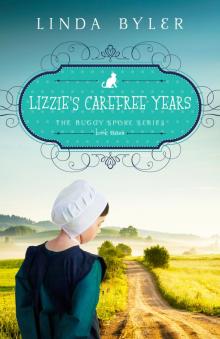 Lizzie's Carefree Years
Lizzie's Carefree Years The More the Merrier
The More the Merrier Love in Unlikely Places
Love in Unlikely Places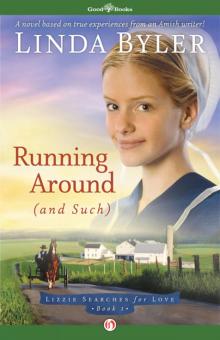 Running Around (and Such)
Running Around (and Such) Wild Horses
Wild Horses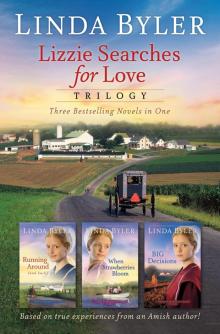 Lizzie Searches for Love Trilogy
Lizzie Searches for Love Trilogy Lizzie and Emma
Lizzie and Emma Little Amish Matchmaker
Little Amish Matchmaker The Witnesses
The Witnesses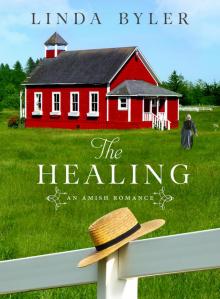 The Healing
The Healing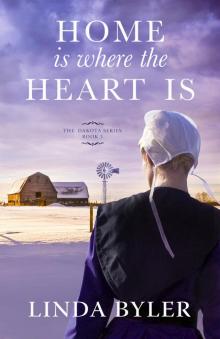 Home Is Where the Heart Is
Home Is Where the Heart Is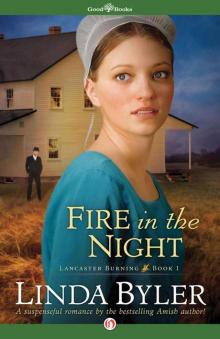 Fire in the Night
Fire in the Night When Strawberries Bloom
When Strawberries Bloom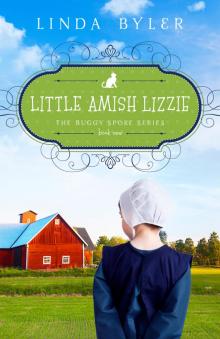 Little Amish Lizzie
Little Amish Lizzie Which Way Home?
Which Way Home?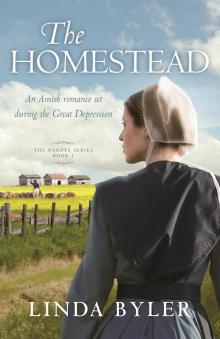 The Homestead
The Homestead Sadie’s Montana Trilogy
Sadie’s Montana Trilogy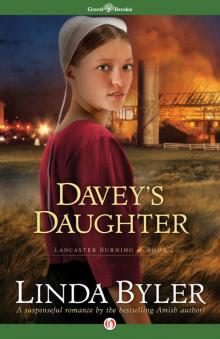 Davey's Daughter
Davey's Daughter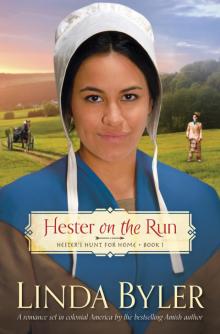 Hester on the Run
Hester on the Run Disappearances
Disappearances Big Decisions
Big Decisions Becky Meets Her Match
Becky Meets Her Match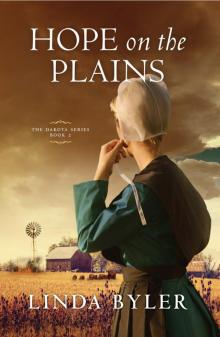 Hope on the Plains
Hope on the Plains Christmas Visitor
Christmas Visitor